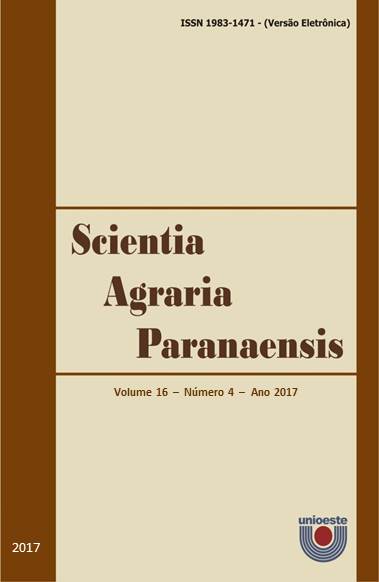Chitosan in the induction of resistance to the damping off tomato seedlings caused by Rhizoctonia solani Kuhn
Mots-clés :
fitopatologia, proteínas relacionadas à patogênese (PRP’s), Solanum lycopersicum L.Résumé
The objective of this study was to evaluate the potential of chitosan in inducing resistance against damping off in tomato caused by Rhizoctonia solani. The tomato seeds were submerged in solution with chitosan for 20 minutes in concentrations of 0.25%; 0.5%; 1% and 2% and in the control (distilled water only). The seeds were sown in polystyrene trays containing substrate inoculated with R. solani and kept in a growth chamber with 12 hours photoperiod and temperature of 25 ± 2 ºC for 14 days. After this period we evaluated the survival of seedlings, length and fresh weight and activity of the enzyme phenylalanine ammonia lyase (PAL), chitinase and β-1.3-glucanase. The results showed that chitosan when applied on tomato seeds at concentration of 0.30% incresead the survival of seedlings growing in substrate inoculated with the pathogen. This result is mainly related to the activation of resistance mechanisms in the plant, evidenced by activation of PAL, chitinases and β-1.3-glucanases enzymes.
Téléchargements
Fichiers supplémentaires
Publié-e
Comment citer
Numéro
Rubrique
Licence
Aviso de Direito Autoral Creative Commons
Política para Periódicos de Acesso Livre
Autores que publicam nesta revista concordam com os seguintes termos:
1. Autores mantém os direitos autorais e concedem à revista o direito de primeira publicação, com o trabalho simultaneamente licenciado sob a Licença Creative Commons Attribution que permite o compartilhamento do trabalho com reconhecimento da autoria e publicação inicial nesta revista.2. Autores têm autorização para assumir contratos adicionais separadamente, para distribuição não-exclusiva da versão do trabalho publicada nesta revista (ex.: publicar em repositório institucional ou como capítulo de livro), com reconhecimento de autoria e publicação inicial nesta revista.
3. Autores têm permissão e são estimulados a publicar e distribuir seu trabalho online (ex.: em repositórios institucionais ou na sua página pessoal) a qualquer ponto antes ou durante o processo editorial, já que isso pode gerar alterações produtivas, bem como aumentar o impacto e a citação do trabalho publicado (Veja O Efeito do Acesso Livre).
Licença Creative Commons
Esta obra está licenciada com uma Licença Creative Commons Atribuição-NãoComercial-CompartilhaIgual 4.0 Internacional, o que permite compartilhar, copiar, distribuir, exibir, reproduzir, a totalidade ou partes desde que não tenha objetivo comercial e sejam citados os autores e a fonte.


